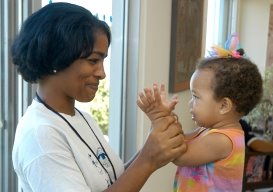
Cuba Prioritizes Children, Mothers
Havana, Apr 18 (Prensa Latina) The relationship between children and parents is a priority in Cuba, from TV spots that encourage good parenting to a law that allows either parent to take up to a year on 60% salary to be with the newborn baby.
Later children go to a day care center until ready for kindergarten, and at any time before the child is 16 the law covers up to a six month absence from work without reprisal if a child becomes ill.
Even before a child is born it´s already high on the agenda and Gyn-Ob departments here have earned great recognition like the record-low infant mortality rate of 4.5 deaths for each 1,000 live births achieved by the Infant-Mother Program (PAMI) in the Cuban province of Holguin.
But that's nothing new, and Cuba usually scores best in regional infant mortality stats.
Pediatrician Francisco Valdés was quoted in Granma International as saying "the island attained its 5.8 infant mortality rate per 1,000 live births in 2004, the lowest in Latin America, primarily due to mass and free vaccination campaigns dating back to the triumph of the Revolution in 1959."
In the Americas Cuban infant mortality is only topped by Canada, and 95% of Cuba toddlers have been inoculated against diphtheria, typhoid fever, influenza, hepatitis B, meningitis, mumps, poliomyelitis, German measles, measles, tetanus, whooping cough and tuberculosis.
UNICEF is very clear to illustrate that Cuba advocates health for young children, and its website shows an almost halving of mortality rate for children under five year-old, form 13 in 1990 to 7 in 2004.
Very new projects have upped these stats even more, like an iodized salt program that liberated the island from iodine deficiency disorders in 2005 and milk fortification plans underway.
Health prevention has made accidents the number one cause of death in children from one to 19 years of age and parenting groups exist for young mothers that concentrate in reducing transmission of STI's and accident prevention.
Cuban women participate in a national Federation with 3.8 million members with more than 175 Guidance Houses for Women and the Family.
Copyright © 2006 - All Rights Reserved.
Prensa Latina









